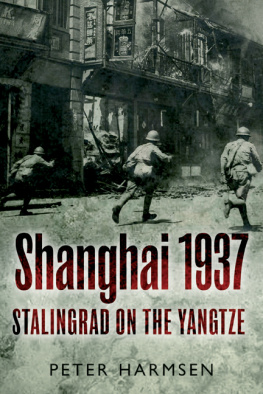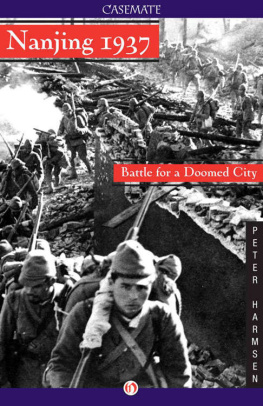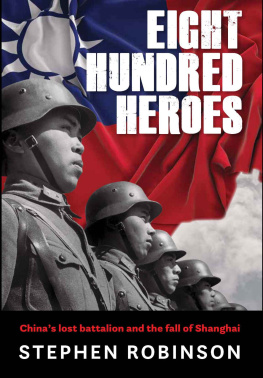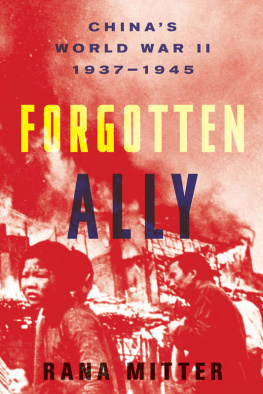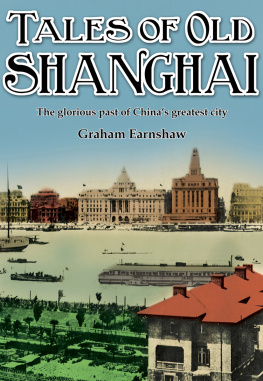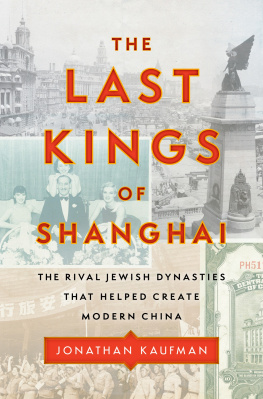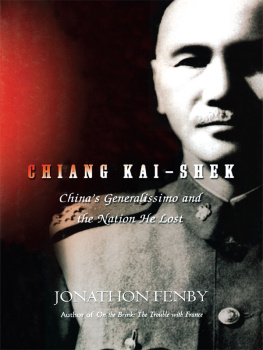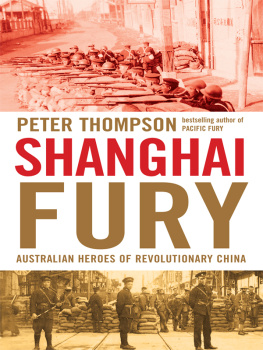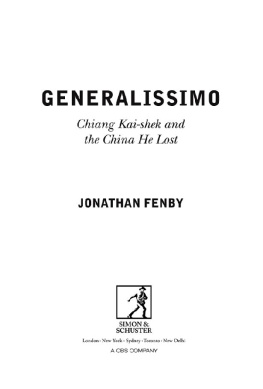

Acknowledgments
NO ENDEAVOR IS A ONE-MAN UNDERTAKING. THIS ALSO GOES FOR Shanghai 1937. The information needed to tell the untold story of the great battle on the banks of the Yangtze had to come from numerous sources, some less obvious than others. I have depended on the help of acquaintances, and the occasional kindness of strangers, without whom this book would never have made it into print.
I wish to acknowledge the following institutions for their generous assistance: Academia Historica, Taipei; the National Central Library, Taipei; the Department Military Archives, Freiburg im Breisgau; and Columbia Center for Oral History. The willingness of the Asahi Shimbun Photo Archives and of the American Geographical Society Library, University of Wisconsin-Milwaukee Libraries, to share their rich and unique holdings of historical images was essential in putting together a pictorial record of the momentous events described in this book.
Among individuals who have contributed, I would particularly like to mention Kashiwagi Kazuhiko, editor at Asahi Shimbun Photo Archives, and Fang Jun, a Beijing-based amateur historian who shows by his own personal example that the memory of the Sino-Japanese War is very much alive in China today. Thanks should also go to my colleague Sam Yeh in the Taipei office of the French news agency AFP for his help in giving this book an Internet presence.
I am extremely grateful for the help provided by the staff at Casemate Publishers, including editorial director Steven Smith, for his enthusiastic support during the entire process of preparing this publication; designer Libby Braden for ensuring that the book ended up as visually appealing as it did; and editor Anita Baker for polishing the manuscript with a keen eye for both the big picture and the small, but important, detail.
The patience of my wife Hui-tsung was crucial. Finally, thanks to my children, Eva and Lisa, for putting up with all the evenings and weekends Dad had to spend in front of the computer.
TAIPEI, FEBRUARY 2013

Bibliography
NEWSPAPERS AND NEWS AGENCIES
China Weekly Review
Christian Science Monitor
Life
North China Daily News
North China Herald
The Daily Telegraph
The New York Times
Washington Post
Associated Press
Reuters
CHINESE-LANGUAGE SOURCES
Cao Jianlang. Zhongguo Guomindangjun jianshi [A Brief History of the Chinese Nationalist Forces]. Beijing: Jiefangjun chubanshe, 2009.
Cao Juren. Wo yu wo de shijie [My World and I]. Beijing: SDX Joint Pub-lishing Company, 2011.
Chen Cheng. Chen Chen HuiyiluKangri zhanzheng [Chen Chengs Memoirs: The War of Resistance against Japan]. Beijing: Dongfang chuhanshe, 2009.
Chen Cheng. Chen Cheng siren huiyi ziliao [Chen Chengs personal recollections]. Minguo Dangan, 1987, no. 1.
Chen Yiding. Yangshupu Yunzaobin zhandou [Battle of Yangshupu and Yunzaobin], in Bayaosan Songhu Kangzhan: Yuan Guomindang jiangling Kangri Zhanzheng qinliji [ The August 13 Songhu Battle: Personal Recollections from the War of Resistance against Japan by Former Nationalist Commanders], Beijing: Zhongguo wenshi cubanshe, 1987. Hereafter cited as BSK.
Dai Feng et al. 1937 Zhongri Songhu zhanyi [ The 1937 Sino-Japanese Songhu Battle]. Taipei: Zhimingtang, 2011.
Fang Jing, Hongjiang, Baoshan, Yuepu, Guangfu xuezhanji [An Account of the Bloody Battles of Hongjiang, Baoshan, Yuepu and Guangfu], in BSK.
Feng Yuxiang. Wo suo renshi de Jiang Jieshi [ The Chiang Kai-shek That I Knew]. Taipei: Jieyou chubanshe, 2007.
Ge Yunlong. Feng Yuxiang churen disan zhanqu silingzhangguan jianwen [An account of Feng Yuxiangs service as commander of the Third War Zone], in BSK.
Gong Yeti. Kangzhan feixing riji [A Flight Diary of the War of Resistance] . Wuhan: Changjiang wenyi chubanshe, 2011.
Guijun yu Songhu Kangzhan [ The Guangxi Troops in the Songhu Battle] . Shanghai: Shanghai Songhu Kangzhan Jinianguan, 2011.
Guo Rugui. Guo Rugui huiyilu [Guo Ruguis Memoirs]. Beijing: Zhong-gongdang chubanshe, 2009.
Guo Rugui et al. Zhongguo Kangri Zhanzheng zhengmian zhanchang zuozhan ji [ The War of Resistance against Japan: An Account of Frontline Battles]. Nanjing: Jiangsu renmin chubanshe, 2005.
Huang Jie. Wenzaobang, Suzhouhe zhandou [The Battles for Wusong and Suzhou Creeks], in BSK.
Huodao Jingfu riji [Ogishima Shizuos Diary]. Xindian, Taiwan: Lixu wenhua, 2005.
Jiang Gong sixiang yanlun zongji [A Collection of President Jiangs Thoughts and Speeches]. Taipei.
Jiang Jingguo. Kangri Yuwu [Resisting Japanese Aggression]. Taipei: Liming wenhua, 1978.
Jiang Zhongzheng (Chiang Kai-shek). Kunmian ji [Anthology of Encouragement amid Difficulties]. Taipei: Guoshiguan, 2011.
Jiang Zhongzheng (Chiang Kai-shek) (ed.). Kangri zhanshi: Songhu huizhan [ The History of the War of Resistance against Japan: The Songhu Battle]. Taipei: Guofangbu shizhengju, 1962, vol. 13.
Lan Xiangshan. Guijun canzhan jianwen [Information about the Guangxi Troops Participation in the War], in BSK, p. 320.
Li Guanru. Tumu dizhu: Guojun dishiba jun zhanshi [Indomitable Power: The War History of the 18th Army Group]. Taipei: Zhibingtang chubanshe, 2012.
Li Junsan. Shanghai Nanjing baoweizhan [Defensive Battles for Shanghai and Nanjing]. Taipei: Maitian chubanshe, 1997.
Liu Jingchi, Songhu Jingbei Silingbu jianwen [Account of Songhu Garrison Command], in BSK.
Liu Weikai. Luoyang Qiao xuezhanji [Account of the Bloody Battle of Luoyang Bridge], in BSK.
Nanjing datusha shiliaoji [Collection of Historical Records on the Nanjing Massacre], vols. 8, 10, 60, 61, 62. Nanjing: Jiangsu renmin chubanshe, 20052010.
Qin Xiaoyi (ed.). Zhonghua Minguo zhongyao shiliao chubianDuiri Kangzhan shiqi [A Preliminary Compilation of Important Historical Document for the Republic of Chinathe Period of the War Against Japan], vol. 2, Taipei: Zhongguo Guomindang zhongyangweiyuanhui dang-shiweiyuanhui, 1981.
Qiu Weida. Diwushiyishi Luodian fangyuzhan [The 51st Divisions Defensive Battle of Luodian], in BSK.
Riben haijun zai Zhongguo zuozhan [ The Japanese Navys War in China] . Tianjin: Tianjin shi zhengxia bianyi weiyuanhui, 1991.
Shen Keqin. Sun Liren zhuan [Biography of Sun Liren]. Taipei: Taiwan xuesheng shuju, 2005.
Shen Zui. Juntong neimu [ The Inside Story of the Military Statistics Bureau] . Taipei: Xinrui chubanshe, 1994.
Shi Shuo. Bayaosan Songhu Kangzhan jilue [Clever Stratagems Adopted during the 813 Songhu Battle], in BSK.
Song Xilian. Xuezhan Songhu [Bloody Songhu Battle], in BSK.
Sun Shengzhi. Pudong paobing xianshenwei [The Invincible Might of the Pudong Artillery], in BSK.
Sun Yuanliang. Yiwan guangnian zhong de yi shun [An Instant in a Trillion Light Years]. Taipei: Shiying chubanshe, 2002.
Wang Shijie. Wang Shijie riji [Wang Shijies Diary]. Taipei: Zhongyang yanjiuyuan jiandaishi yanjiusuo, 1992.
Wu Yujun. Junmin cheng yiti [Army and People Become One], in BSK.
Xiangjun yu Songhu Kangzhan [ The Hunan Troops in the Songhu Battle] . Shanghai: Shanghai Songhu Kangzhan Jinianguan, 2010.
Xiao Yiping et al. Zhongguo kangri zhanzheng quanshi [A Complete History of the War Against Japanese Aggression]. Chengdu: Sichuan chuban jituan, 2005.
Xiong Xinmin. Yangshupu yu Jiangwan kangzhan [The Resistance War in Yangshupu and Jiangwan], in BSK.
Next page
